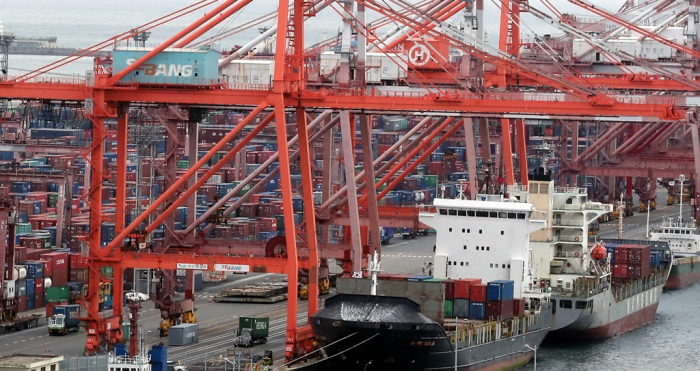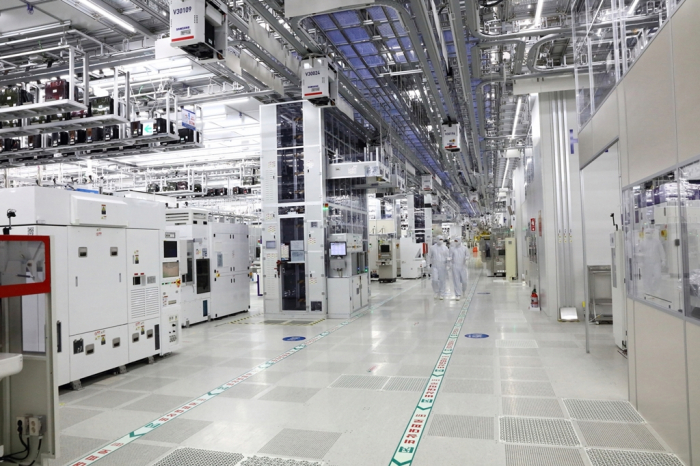Economy
Korea trade deficit jumps as chip exports fall on Aug. 1-10
Korea may see shortfall for fifth month, the longest deficit streak in more than 14 years; balance against China stays in the red
By Aug 12, 2022 (Gmt+09:00)
2
Min read
Most Read
LG Chem to sell water filter business to Glenwood PE for $692 million


Kyobo Life poised to buy Japan’s SBI Group-owned savings bank


KT&G eyes overseas M&A after rejecting activist fund's offer


StockX in merger talks with Naver’s online reseller Kream


Mirae Asset to be named Korea Post’s core real estate fund operator



South Korea suffered from a larger trade deficit in the first 10 days of the month as semiconductor exports declined on weaker demand for memory chips that Samsung Electronics Co. and SK Hynix Inc., the world’s two largest makers of the product, manufacture.
Asia’s No. 4 economy reported a shortfall of $7.7 billion during the Aug. 1-10 period, far higher than a deficit of $4.7 billion in the entire July, according to the customs data on Thursday. That raised the deficit so far this year to $22.9 billion, swinging from a surplus of $14.4 billion in the same period of 2021.
If the trade balance remains in the red this month, the country will report a shortfall for five months in a row, the longest deficit spree since the December 2007 and April 2008 period, just before the 2008-09 financial crisis hurt the world’s economy.
Total exports increased 23.2% to $15.7 billion in the Aug. 1-10 period from a year earlier, lower than a 34.1% growth in imports.
TO SEE FIRST DROP IN MORE THAN TWO YEARS
That came as overseas sales of semiconductors declined 5.1% to $3 billion. Once the chip exports failed to rebound by the end of August, the industry would see the first drop in exports since June 2020.
Semiconductor exports have been slowing with their growth down to 2.5% in July from 10.8% in June and 14.2% in May.
Sales of memory chips stayed sluggish on weaker consumption, although system chip exports remained strong on firm demand for digital transformation. South Korea is the home to the world’s top two memory chipmakers – Samsung and SK Hynix.

Apart from semiconductors, exports of wireless communication devices and computer peripherals slumped by 17.7% and 19%, respectively. On the other hand, shipments of petroleum products surged 177%, while exports of passenger cars and auto parts jumped 191.9% and 29.4%, respectively.
Imports growth was led by purchases of energy resources. Intakes of crude oil rose 50.1%, while imports of natural gas and coal soared 96.4% and 162.5%, respectively. Purchases of passenger cars, semiconductors and chip equipment jumped 71.7%, 44.6% and 23.7%, respectively.
DEFICIT AGAINST CHINA
South Korea continued to report a trade deficit against China, its largest overseas market, with a shortfall of $890 million in the first 10 days of August. Exports to the world’s second-largest economy fell 2.8% to $3.9 billion, while imports increased 29.2% to $4.8 billion.
South Korea already reported a deficit against China in July for a third straight month for the first time since the two countries established diplomatic ties in 1992.
South Korea also logged deficits in trades with other key economies including the US and the European Union.
The Asian country reported a shortfall of $703 million against the US, poised to log the first monthly deficit since August 2011. Deficits against the EU and Japan totaled $141 million and $1.1 billion, respectively.
Write to Jin-gyu Kang at josep@hankyung.com
Jongwoo Cheon edited this article.
More to Read
-
 EconomyKorea inflation hits highest point since 1998 crisis, BOK to hike rates
EconomyKorea inflation hits highest point since 1998 crisis, BOK to hike ratesAug 02, 2022 (Gmt+09:00)
3 Min read -
 EconomyKorea sees record H1 trade deficit, weak consumer sentiment
EconomyKorea sees record H1 trade deficit, weak consumer sentimentJul 01, 2022 (Gmt+09:00)
5 Min read
Comment 0
LOG IN


